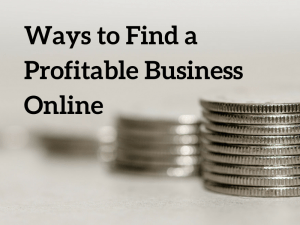 I get this question all the time with people who are new to online marketing. They would ask me what is a profitable business to start and how soon they can make money. To be honest, the answer isn’t always straightforward and that’s why I’ve come up with these guidelines to make the pathway a bit clearer for everyone.
I get this question all the time with people who are new to online marketing. They would ask me what is a profitable business to start and how soon they can make money. To be honest, the answer isn’t always straightforward and that’s why I’ve come up with these guidelines to make the pathway a bit clearer for everyone.
Before I begin, let me elaborate a bit on the ‘profit’ side, because there are a few theories that go behind it.
Firstly, you need to offer something that people want to buy and can do so effectively online. It has to provide them values without having to wait too long.
Secondly, consider the selling price that’s comfortable for people to part with their money. Nowadays, it’s not uncommon for customers to spend hundreds on a single purchase.
Next, you want to keep the overhead to the minimum. That’s why I always recommend starting with affiliate marketing because all you need is a functional website. Of course, there’s also the possibility of selling your products or go into dropshipping, but both of these will incur additional cost to source for suppliers or install eCommerce solution. A lot of beginners pour money into these setups even before knowing how to market their businesses so it’s a bit risky there.
In the explanation that follows, I’ll be using ‘products’ and ‘niches’ interchangeably with ‘business’ as they more or less mean the same thing in this context. So, with those three things in mind, let me walk you through the process.
1 – Google Search
For many of us, there’s no better place to search for a topic than going to the search engines. It’s the encyclopedia of things and can usually yield specific answers if you narrow down the queries. For example, this is the results when I searched for “Profitable Online Business 2018”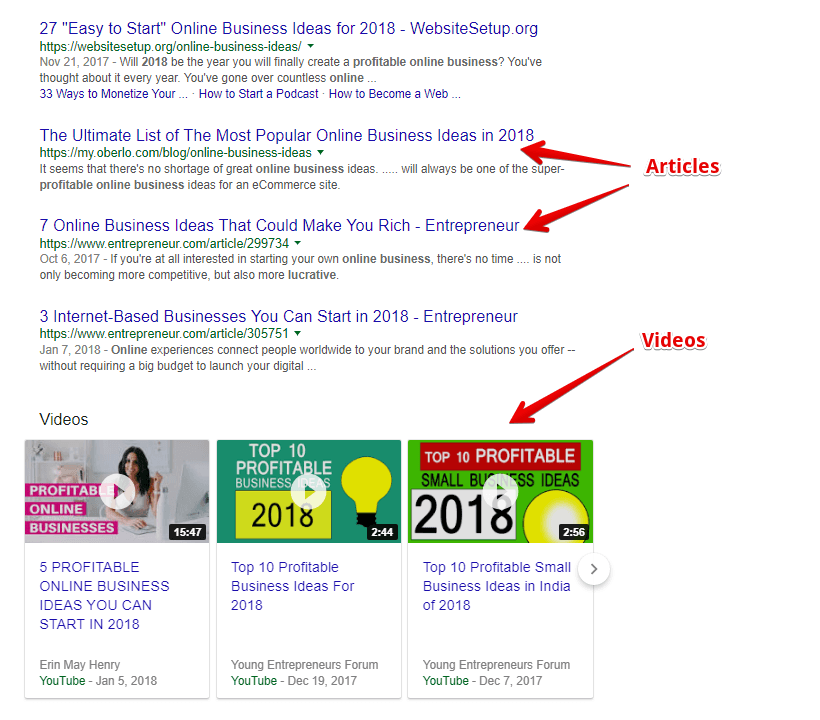
The first few results are usually ads that may or may not be relevant, so I tend to look down further where more articles resemble the topic we have in mind. Most of them are articles and videos that can give a good overview with links pointing to people or brands that have successfully built their businesses in respective niches.
From here, you can start to do a bit more research.
2 – Google Trend
This is a free tool that can be used to explore what the world users are currently searching and since it’s a visual-based data, it’s much easier to understand. To get the most effective results, I would recommend using at least two words that are generic names to certain product types. Anything less than that, the result may be too broad or if it contains too many words, nothing will show up.
In the first example, we could see that ‘hair extension’ gets a constant high amount of search over time. That means this trend is quite stable.
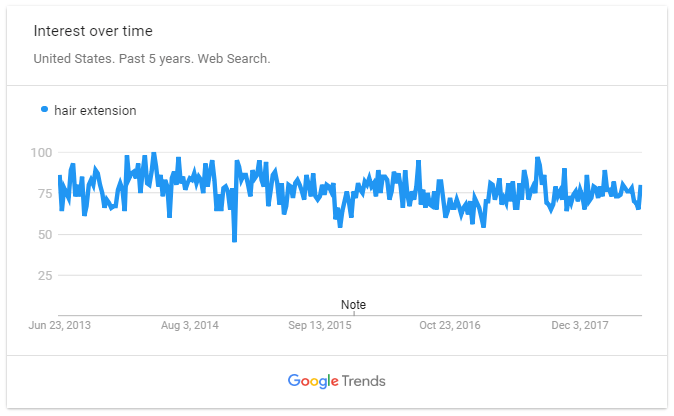
‘Polaroid camera’ on the other hand, has its ups and downs, suggesting that this is a seasonal niche. That means market demand is likely more on other months.

Something new that’s been populating online for a while is ‘CBD oil’ and judging from the curve, this is an upward trend. That means, going into this business now can potentially generate a lot of profit in the next few months/years to come.
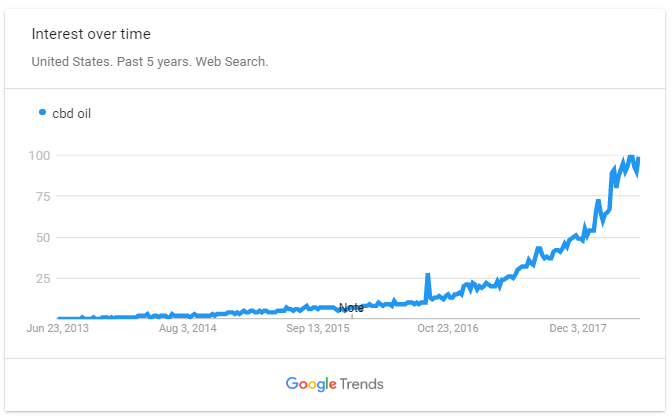
A downward trend like “masticating juicer” is something that you want to be cautious because after reaching a peak at some point, the popularity of the product seems to be fading off. It might still be profitable, just not on a large scale.
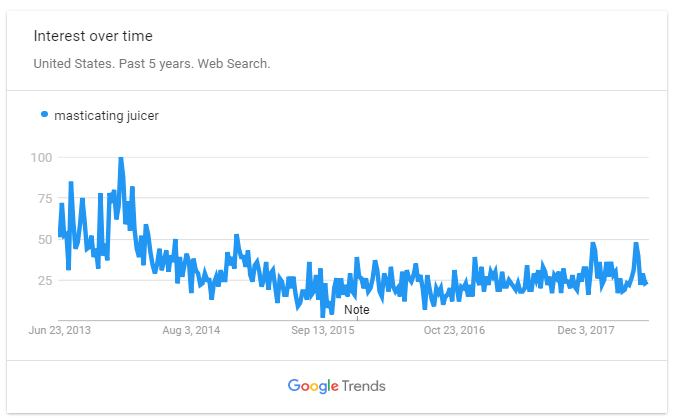
If you study closely, all the four products are related to evergreen niches which are beauty, health, and technology that are supposedly lucrative businesses. However, within each niche, you still need to filter products that do better than others or don’t do well at all. Such a selection process can save you time from promoting the wrong stuff online.
3 – Marketplace Research
Now, let’s go into the real world and see what people are buying. The first place I usually like to search is Amazon because it has millions of products across a variety of niches. The choices are overwhelming, but there’s a way around it.
Try entering “best sellers in X” (X = shopping departments) on the search bar and Amazon will automatically roll out some of their popular products within a given niche. Pay attention to the prices as well as customer reviews. You want to search for something that has good reviews and stays within the average customers’ spending zone.
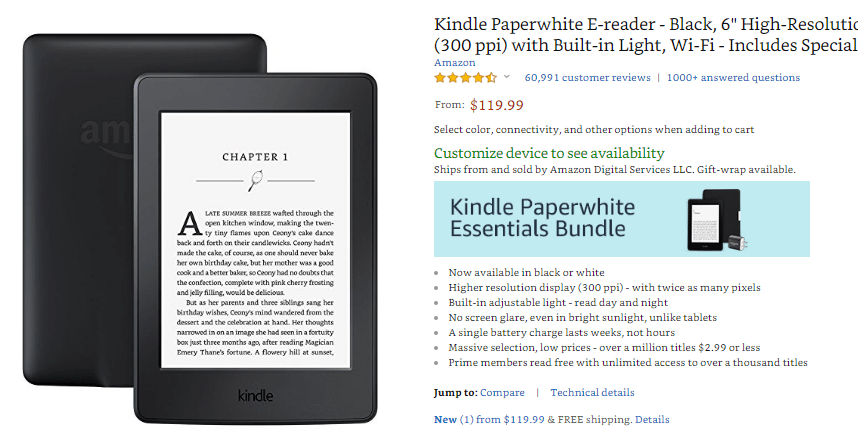
The first thing that caught my eye in the electronics department is the Kindle e-Reader. It costs about $120, comes with Prime, and has more than 60K reviews which earn this product a rating of 4.5/5 stars. These reviews can provide a ton of insights for people who are thinking of buying one and you can leverage from this information as a marketer too.
The same search technique can be repeated for other departments too, and you’d be surprised that even common items like a knife sharpener or a water float can sell for a high volume of numbers. If you are looking for something more niche-specific, you could also try Etsy for those who are into arts and crafts or Home Depot for those interested in home improvement works.
Finding a profitable niche isn’t that difficult, especially in a marketplace setting. What’s more challenging is how to market them online and that’s where the next step comes in.
4 – Targeted Keyword Research
If you haven’t heard of this, it simply means finding out specific keywords that people are searching online and determining if those phrases are worth promoting or not. Now, we are narrowing down into things here, and understanding the demand and competition is how we are going to decide on a targeted keyword.
Here’s Seth, explaining the concept in layman’s term.
Starting with the Google search bar, enter the generic product keywords, and take note of the suggested key phrases that roll out automatically when you add more words, either from the front or the back. Also, if you look at the bottom of the page, you’ll find more keywords in the “Searches related to…” column too. These are all queries related to ‘drone camera’ that people are actively searching for online.
Are any of these keywords good to use for your marketing? Well, first of all, you need to select keywords that contain at least 4 words, they should make human sense and ideally, has commercial intent. Now, let’s run these 3 examples through Jaaxy, my favorite keyword tool.

The AVG column is the average number of searches per month (demand) while QSR is the number of competing websites. The rule of thumb for beginners is easy – AVG should (ideally) be more than 100 and QSR less than 100.
With the first keyword, the QSR is way over and that means, it will be a lot harder for your site to rank. The second one is quite good, but no one is searching for this topic, so it’s not likely a profitable keyword to use, at least for now. The last one is the best choice and it comes with a product brand name too, so you can easily link this topic to a product page or a review.
And that’s how easy it is. If you have a niche idea in mind right now, simply enter the keywords into the plugin below and see what Jaaxy reveals.
5 – Affiliate Program Opportunities
For those who are choosing the affiliate marketing route, this is an additional step that you need to take. I mean, what’s the point of finding something that is profitable, but doesn’t reward you, right? With physical products, commission rates could vary between 2 % to 10%, while with digital products, you can sometimes expect a huge jump of profit to about 70%.
Depending on what you know so far, you could go to the merchant’s site directly and search the footer area to see if you can find a link to their affiliate/referral program page. From there, they should be able to guide you through the application process.
Or, you could also search on Google using these keywords;
- Product generic name + affiliate programs
- Product brand name + affiliate programs
And that should yield some relevant results.
Alternatively, sign up with any of these affiliate networks and search for potential products or merchants from within. They are free to join and application approval is fairly quick. However, make sure you’ve set up an affiliate website first and get some traffic going because, oftentimes, that will be the prerequisite.
Did You Find a Winner?
Before you venture too far off, remember this. Rule of thumb – don’t select a niche simply because you’ve read or heard from somewhere that people are making a lot of money with it. Follow through with this methodology, research diligently, and run them through reasoning based on facts – not fad.
Will you be guaranteed success? Of course not, but at the very least, you are making some educated guess before investing time and money into it. Nevertheless, don’t be afraid to try new things. There are billions of people searching on the internet daily, so you’ll surely come across a niche you like and worth pursuing.
I hope after reading this, you’ll be excited to start a profitable business online. If you’re feeling stuck, please drop by my recommended training platform where I can offer more personal guidance.
Hope to hear from you soon.

Finding a profitable online business idea is not as easy as it is portrayed by many unscrupulous marketers who promote their less than viable programs, often at high cost.
When I first started with online marketing about 4 years ago, I was caught up by the offers that promised lots of profits with little work. It cost me not only cold hard cash, but also time and effort. At the end of the day, they were all a waste of time.
After many experimentation and landing on the right training program, I have branched out from affiliate marketing to selling my own products, drop shipping, training, and membership sites.
It all starts with solid planning and then, execution of that plan consistently over an extended period of time. As with most businesses, you have to be willing to invest today for what you are building and to realize your vision. It is possible, but there are no instant millionaire programs that are legitimate that I have seen.
This article is a good starting point for those who are serious about building a business online that will result in enough profits to replace a more traditional 9-5 job. It is absolutely possible – many thousands or millions are doing it now. Hopefully, people will run across this post before wasting their time, money and effort as I did so long ago.
Great article.
I haven’t looked at using Google Trends before in assessing if it was a product worth marketing. Does this work based on search volume – so it will work for absolutely anything including non product related stuff? Do you recommend any specific affiliate program over any other, or are all of the ones you list equally good.
Just want to initially concentrate on one and interested to hear from you where to start.
Hi Bryan,
It works based on the trending search terms and yes, it would work for non-product keywords as well. As for affiliate programs, the ones above are good places to start with because the approval to join the network is almost always 100%. If you couldn’t get good results from any of the programs, then it’s probably better to search for private affiliate offers instead.
I really appreciate all your examples here! This is a great step by step for beginners and more experienced affiliate marketers like myself. I generally focus on products I am already familiar with but I need to branch our more and using the Google Trends, Google search and the Amazon tactics is something I only do rarely. I should do that a lot more and you have reminded of these all in one place.
I agree that affiliate marketing is definitely the way for beginners to start. Why bog yourself down with physical products to make or buy and hold and then have to ship when you can cut all that out and just learn the website side?
You can always branch out to add your own products later but it is smart to start with affiliate marketing and learn how to make and run a successful website so that you can sell anything you want in the future. With a good website you can get into making your own physical products or even e-books and other electronic products later when you have the basics of online marketing figured out. In the meantime you can start making money with affiliate marketing and have much lower start up costs.
Finding a profitable niche and scaling it is not as easy as I thought when I started my online business and I seem to be missing a few things
Seeing you narrowing the process made me realized where I have not leveraged like Google Trend. I hope to try this venue also while figuring out how to promote as an affiliate. Let’s see what happens.
Just one question about Amazon Associates – how many times can you sign up with them?
Technically, you only need to sign up once. The reasons you may want to ‘sign up’ again is when your Associate account is banned. The capability to reinstate the account thus depend on what type of service agreement that you’ve violated in the first place. If it’s a misunderstanding or technical issue, you can write in to appeal. But if it involves exploiting the system, almost always they wouldn’t reinstate the account – so you want to be very careful with that.
Hope this helps.
As usual excellent article Cathy, always enjoy reading what you have to say on various subjects. I’m still new to affiliate marketing and the biggest hurdle I’ve had to overcome so far is analysis paralysis and accepting that success is not something that will happen overnight or that is even guaranteed! I’m a perfectionist so I want to have everything planned out on day one but that’s just not realistic. Instead I have had to force myself to just start writing content because that’s the only way I’m going to learn and get real experience with affiliate marketing.
Hi Jon, producing content is really the core to make any online business a success, but it’s also the hardest for most beginners because it’s time consuming and writing skills vary according to individuals. From experience, I know it takes many ‘bad’ articles before I actually understood how to write ‘good’ ones. Practice is definitely key and I couldn’t emphasize more on that. The more you do it, the more ‘perfect’ it becomes.